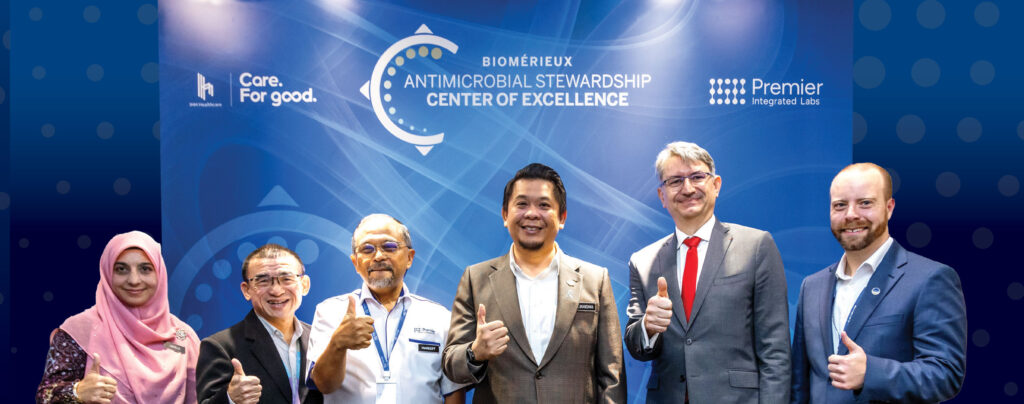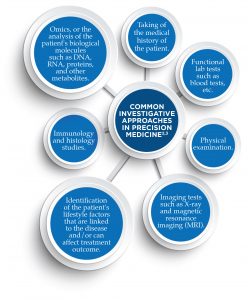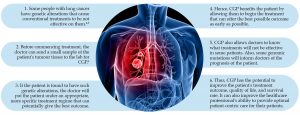Left to right: Dr Mark Miller (Chief Medical Officer of bioMérieux), His Excellency Axel Cruau (Ambassador of France to Malaysia), YB Dato’ Lukanisman bin Awang Sauni (Deputy Minister of Health Malaysia) and En Mohd Hareeff Muhammed (CEO of Premier Integrated Labs and Chairman of Organising Committee of Center of Excellence) officiating the event.
Kuala Lumpur, 23 November 2023 – Healthcare leaders and experts from public, private and global healthcare organisations came together yesterday for the landmark Antimicrobial Stewardship (AMS) Center of Excellence (COE) Day Symposium, jointly organised by bioMérieux, IHH Healthcare Malaysia, and Premier Integrated Labs. The symposium facilitated knowledge exchange and interconnectivity between AMS teams from different specialities, to address the threats of Antimicrobial Resistance (AMR). AMR is a major global health concern that hampers our ability to treat common infectious diseases, resulting in prolonged illness, higher healthcare costs, and increased mortality.
They shared insights into the challenges posed by AMR and the role of AMS as a solution. The symposium also highlighted the importance of diagnostics in AMR control, the link between antimicrobial resistance and judicious use of antibiotics, and initiatives in the public and private healthcare sector for controlling AMR.
Dr Mark Miller, Chief Medical Officer at bioMérieux and an expert on AMR and AMS, addressed how latest diagnostic tests can help physicians in adopting AMS principles while providing appropriate treatment for infectious diseases. Meanwhile, the National Institute of Health (NIH) presented their insights on national antimicrobial resistance data, which is integral in directing national efforts against this public health threat.
The symposium marked the first anniversary of the establishment of the AMS Center of Excellence (COE) partnership between bioMérieux, IHH Healthcare Malaysia and Premier Integrated Labs. The latter two healthcare providers join healthcare institutions in China and India to be designated as AMS COEs in Asia Pacific. Since its establishment, the Malaysia COE has marked several milestones in the fight against AMR. Notably, they have established an antibiotic resistance reporting framework, and organised nine AMS education programmes for front line healthcare professionals to advance their skills in AMS.
The presence of Deputy Minister of Health, YB Dato’ Lukanisman bin Awang Sauni, underscored the national importance of the symposium. YB Dato’ Lukanisman, in his speech said, “I am extremely pleased to see a partnership with the private sector committed to combating AMR. The effort to overcome this global threat requires collaboration from multiple different sectors. I would also like to congratulate bioMérieux, IHH Healthcare Malaysia and Premier Integrated Labs for being the first AMS COE in the region, and for organising a successful event today.”

Mr Jean-François Naa, CEO of IHH Healthcare Malaysia, added, “At IHH Healthcare Malaysia, we are fully committed to combating AMR. It is integrated into our global sustainability goals, and we have set up an active AMS committee in Malaysia to strategically spearhead initiatives. In this battle against AMR, knowledge remains our strongest ally. The exchange of insights and experiences between global experts, local healthcare leaders and private healthcare providers is crucial, as we navigate these uncharted waters. Moving forward, it is crucial that we work together strategically to combat resistance, instead of in silos.”
The symposium was a significant step towards addressing the global health concern of AMR. It not only facilitated knowledge exchange and collaboration but also highlighted the importance of strategic partnerships in combating AMR
| ABOUT ANTIMICROBIAL RESISTANCE
Antimicrobial resistance (AMR) is a global health crisis caused by the natural mutation of bacteria, fungi, viruses, and parasites, leading to their resistance to antimicrobials. This means that standard antimicrobial treatments become ineffective, and infections persist, increasing the risk of severe consequences to the patient. AMR is directly responsible for 1.27 million deaths annually and is associated with 4.95 million deaths worldwide due to drug-resistant infections. Combating AMR is critical to safeguard the efficacy of antibiotics for future generations. The appropriate use of diagnostics can guide responsible antimicrobial use, preserving their lifesaving potential. |
| ABOUT THE CENTER OF EXCELLENCE PARTNERSHIP
bioMérieux adopts a proactive, partnership-driven approach to combat AMR. Through diagnostic and data-driven solutions, bioMérieux strives to enhance AMS efforts. The AMS Centers of Excellence (COE) designation is awarded to leading hospitals globally that commit to best AMS practices. Currently, bioMérieux is partnered with thirteen sites across multiple continents. IHH Healthcare Malaysia and Premier Integrated Labs have achieved the distinction of becoming the first healthcare providers in ASEAN to be awarded the COE. This partnership aims to promote data-driven best practices as well as to advance medical education in the field of AMS. It also focuses on generating real-world medical and economic data, emphasising the value of combining diagnostics, medical education, lab consultancy services, and information technology solutions. This partnership symbolises a significant step toward a world free from the threat of AMR. By inspiring other health institutions, the COE can contribute to increasing the quality of care and improving the level of healthcare systems in Malaysia. |
This article is brought to you by




 MS HENG CHAI YIN
MS HENG CHAI YIN
 MS DEEPTI SARAF
MS DEEPTI SARAF
 EN HAREEFF MUHAMMED
EN HAREEFF MUHAMMED